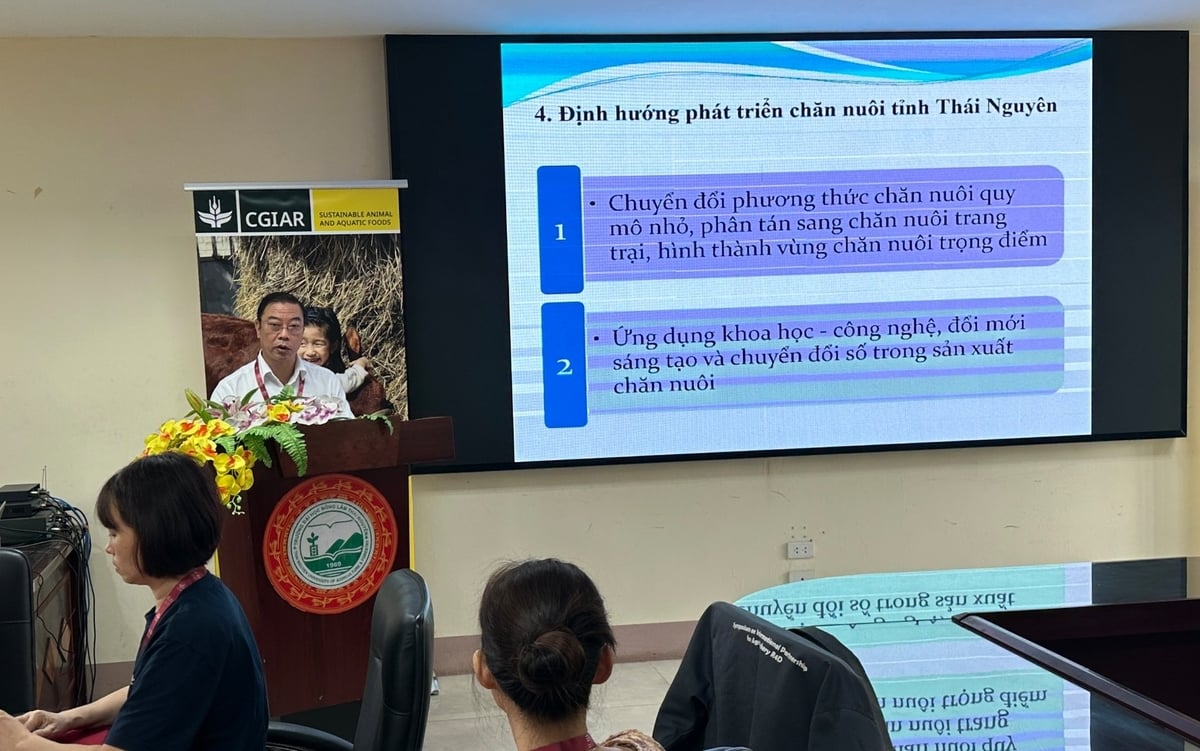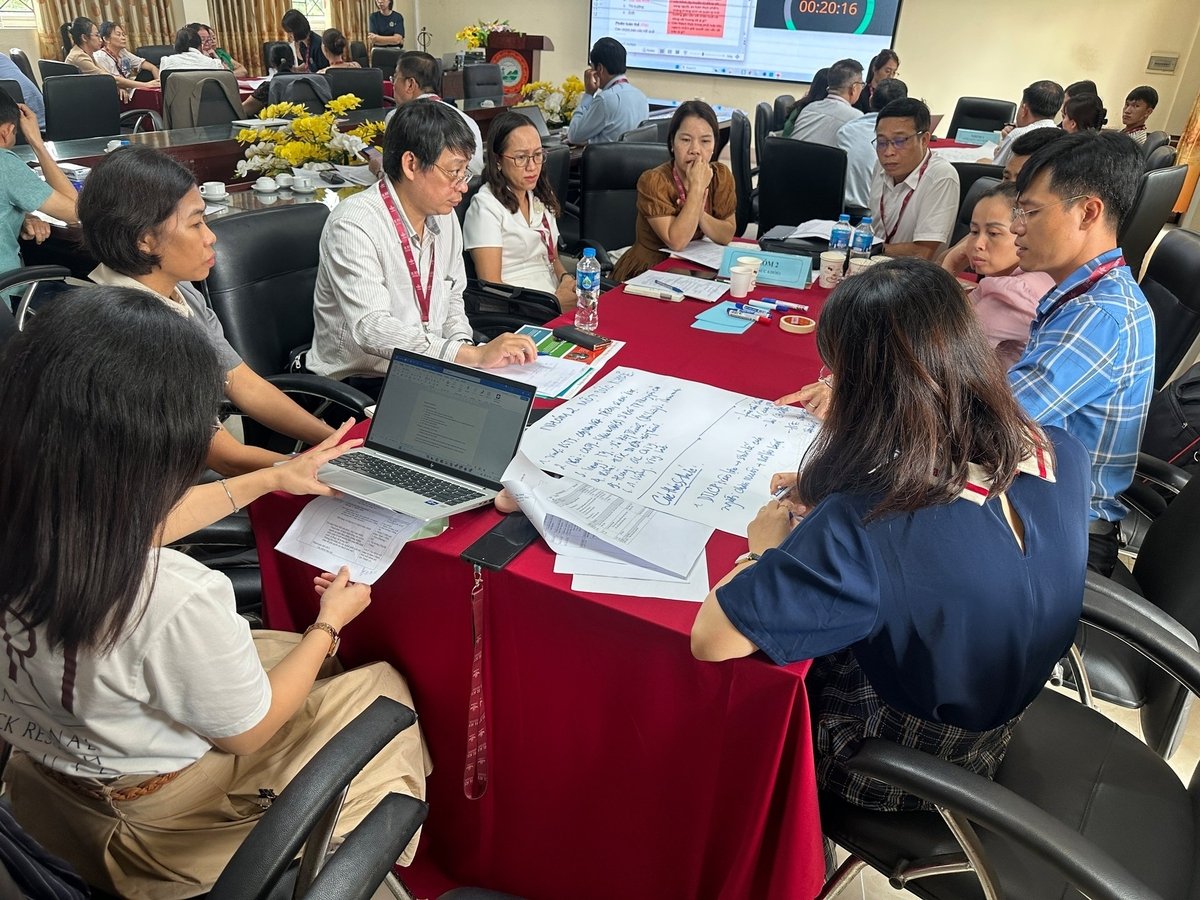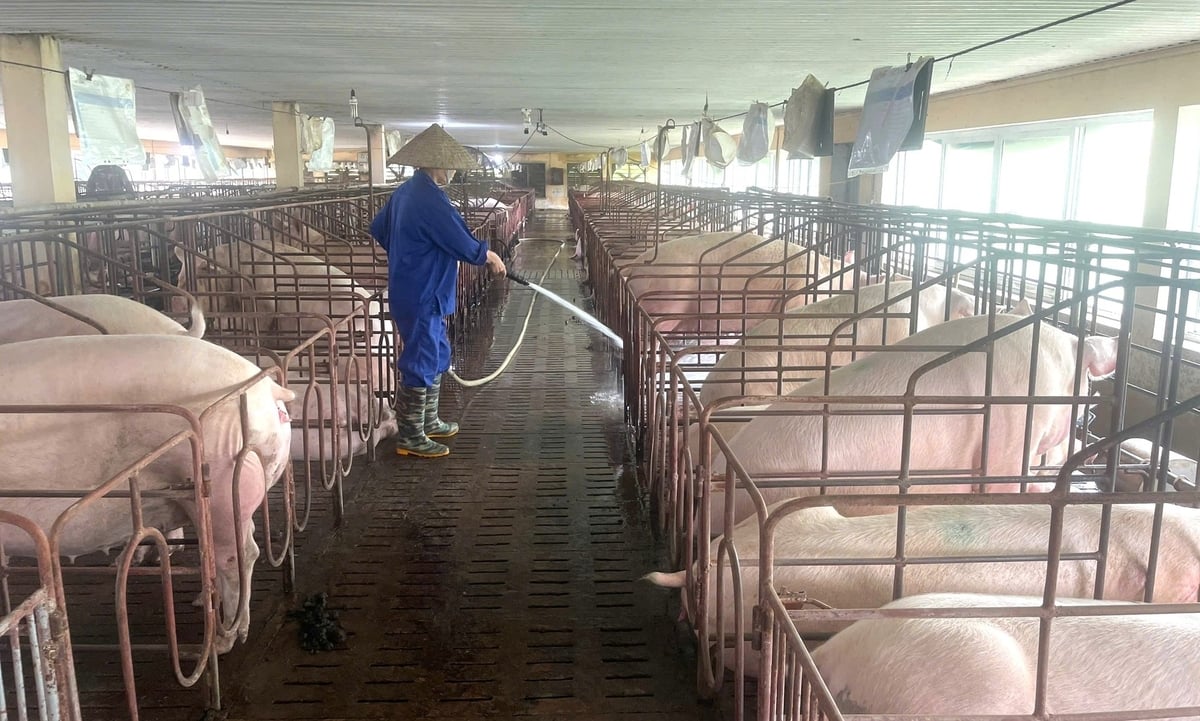December 25, 2025 | 05:45 GMT +7
December 25, 2025 | 05:45 GMT +7
Hotline: 0913.378.918
December 25, 2025 | 05:45 GMT +7
Hotline: 0913.378.918
SAAF consists of six main areas of action: Productivity+; Markets and Policies; Climate and Environment; One Health; Digital and Data Solutions; Gender, Youth, and Social Inclusion.
Recently, CGIAR launched the Sustainable Animal and Aquatic Food (SAAF) Program. The program aims to support the development of healthier, more sustainable, and more inclusive animal and aquatic food systems. In Vietnam, the program is being implemented in two provinces: Thai Nguyen and Son La.
SAAF is designed to address a wide range of challenges, including low productivity, complex disease outbreaks, rising antimicrobial resistance, degradation of terrestrial and aquatic ecosystems, and ineffective natural resource management.
Thai Nguyen University of Agriculture and Forestry (TUAF), in collaboration with the International Livestock Research Institute (ILRI) and the International Center for Tropical Agriculture (CIAT), organized a co-design workshop with the participation of 40 delegates from various sectors, including agriculture, health, environment, veterinary services, the Women’s Union, the Youth Union, as well as market actors (feed and breeding companies, farmers, traders, slaughterhouses, processors…).
At the meeting, Mr. Nguyen Quoc Huy - Deputy Head of the Thai Nguyen Sub-Department of Animal Husbandry, Veterinary, and Fisheries - reported that after the upcoming merger (August 2025), Thai Nguyen will have over 135,000 buffaloes and cattle; nearly 888,500 pigs; 19.6 million poultry; 80 large-scale farms; 786 medium-scale farms; and 753 small-scale farms.
SAAF is expected to apply technical innovations to increase productivity and profitability while reducing emissions; improve diets with animal- and aquatic-based foods; strengthen resilience and enhance health and livelihoods; and boost investment…

Mr. Nguyen Quoc Huy, Deputy Head of the Thai Nguyen Sub-Department of Animal Husbandry, Veterinary, and Fisheries, speaking at the meeting. Photo: Quang Linh.
Despite the implementation of numerous disease prevention measures, African swine fever still poses a risk of widespread outbreaks, particularly in 37 communes and wards in the northern part of Thai Nguyen province. As of August 25, 2025, ASF had been detected in pig herds in 74 communes and wards, leading to the culling of 16,196 pigs.
“Small-scale and scattered livestock farming still accounts for over 50%. Environmental protection efforts remain limited. The proportion of facilities applying VietGAP standards, biosecurity measures, disease safety practices, or engaging in chain-linked livestock production is still low,” Mr. Huy pointed out, noting the existing shortcomings and difficulties in disease prevention and control.
In the coming period, the livestock sector of the province renowned as the land of premium tea will orient toward transitioning from household-based, dispersed farming to farm-scale operations, forming key livestock production zones, applying science and technology, fostering innovation, and promoting digital transformation. At the same time, the province also aims to expand circular agriculture models that are climate-resilient and low-emission.
“The livestock sector of Thai Nguyen looks forward to CGIAR’s cooperation in technology transfer, capacity building, the development of agricultural value chain models, and policy research support,” Mr. Huy proposed.

Group discussions at the meeting. Photo: Quang Linh.
At the meeting, delegates discussed and highlighted the current situation of livestock production in Thai Nguyen, noting challenges such as low productivity due to disease issues, feed and breeding stock quality, ineffective livestock waste management, and weak value chain linkages.
The goal of SAAF is to develop models that serve as drivers for transforming livestock into a key economic sector - modern, environmentally sustainable, producing safe, nutritious, high-quality, branded products that are competitive in the market.

Farmers in Thai Nguyen show strong interest in biosecure pig farming models. Photo: Quang Linh.
Dr. Nguyen Viet Hung – Asia Regional Director of ILRI – remarked: “One of the key highlights of SAAF is the multi-stakeholder approach to co-designing solutions, setting expected outcomes, and building activities that are not only based on scientific evidence but also tailored to local contexts and jointly owned by the beneficiary communities themselves."
Regarding its six areas of action:
(i) SAAF is oriented toward supporting producers to apply technical innovations to increase productivity and profitability, reduce emissions, and enhance the nutritional value of food.
(ii) It seeks to strengthen the resilience of animal food systems through climate-adaptive, low-emission initiatives and business models.
(iv) It emphasizes the importance of ensuring the safe and healthy production and consumption of food for humans, animals, and ecosystems.
(v) It promotes initiatives that foster fair, efficient, and sustainable transformation of animal food markets.
(vi) It aims to close gender gaps and create job opportunities, including for women, youth, and vulnerable groups.
(vii) It leverages digital innovations, AI-driven analytics, and interoperable data systems.
Dr. Phan Thi Hong Phuc – Vice Rector of TUAF – stressed the importance of applying the One Health approach in Thai Nguyen, with a focus on food safety, antimicrobial resistance, and zoonotic diseases, integrated within sustainable value chain production.
Dr. Phuc also underlined the need to further integrate other aspects such as productivity, environment, markets, and value chains to better meet the demands of local livestock systems and public health. She expressed hope that the SAAF Program will continue to broaden its scope of support and mobilize more local resources, with particular emphasis on developing livestock value chains that generate high-value, competitive products. This, she noted, will be a crucial pathway to increasing household income, fostering sustainable socio-economic development, and affirming SAAF’s role as a strategic and long-term partner in Thai Nguyen.
Maintaining a strong and enduring One Health partnership between CGIAR and Thai Nguyen partners established through CGIAR’s Agriculture for Nutrition and Health (A4NH) Program, further advanced by the CGIAR One Health Initiative, and now carried forward under the SAAF Program has generated highly practical and meaningful benefits for local communities.
Translated by Kieu Chi

(VAN) An Giang is actively expanding its implementation of the Sustainable Rice Platform (SRP) standards to help farmers reduce costs, increase income, and protect the environment.

(VAN) From changing soil management practices to reducing input use, many pepper farms in Lam Dong are showing clear results toward low-carbon production.

(VAN) In 2025, An Giang's agriculture achieved positive results, highlighted by stable rice production and the effective implementation of the 'One Million Hectares of High-Quality, Low-Emission Rice' project.

(VAN) Private sector will be a powerful force for investment and innovation to share solutions for nature conservation and biodiversity restoration.
/2025/12/18/4844-4-223614_595.jpg)
(VAN) Building on the 'Large-Scale Rice Field' project, An Giang is developing high-quality rice raw material zones, strengthening consumption linkages, and standardizing processes to meet market requirements.

(VAN) With support from KOICA, livestock sector is developing the regulatory framework for management based on South Korea’s experience.
/2025/12/17/0042-2-075234_14.jpg)
(VAN) In Vinh Long, high-quality, low-emission rice models are being scaled up from cooperatives, helping reduce production costs, increase farmers' incomes, and protect the environment.